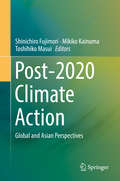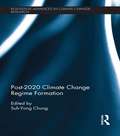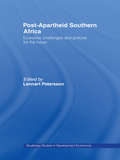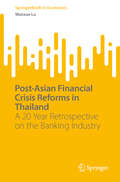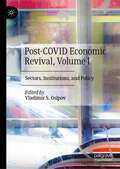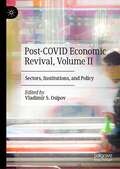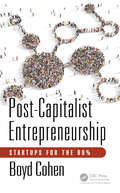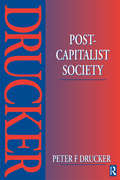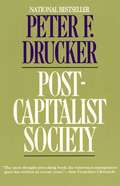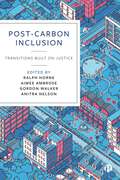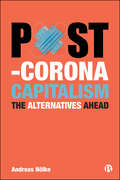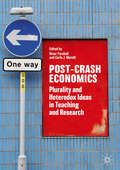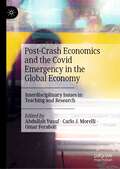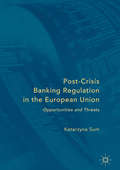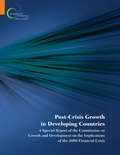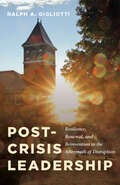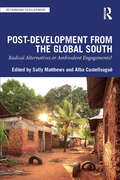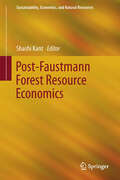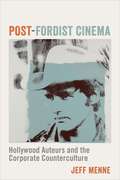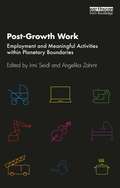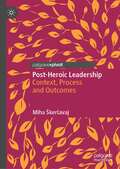- Table View
- List View
Post-2020 Climate Action
by Shinichiro Fujimori Mikiko Kainuma Toshihiko MasuiThis book summarizes assessments of the Paris Agreement to provide an excellent introduction to this research field. The AIM/CGE (Asia-Pacific Integrated Modeling /Computable General Equilibrium) model, which is the core of AIM modeling framework, is used for the assessment. The first part focuses on global issues, presenting both short-term (a few decades) and long-term (century scale) assessments in the context of the Agreement's ultimate climate goal. It also discusses policy implementation and climate risk. Part 2 is a collection of assessments of individual Asian countries, providing insights into the national situations and detailed analyses. It includes contributions from Asian countries as well as NIES (National Institute for Environmental Studies, Japan) members. The main conclusion is that many countries require changes to their energy systems change and societal transformation in order to meet emissions targets. Part 3 describes in detail the AIM/CGE model, which is used to evaluate the climate and energy policies by simulating the future economic and energy and environmental situation in the Asia-Pacific region. This section can be used as a standard text on CGE modelling in climate change mitigation.
Post-2020 Climate Change Regime Formation (Routledge Advances in Climate Change Research)
by Suh-Yong ChungThe fate of the climate change regime hangs in the balance as the UN-led negotiations try to forge a new international strategy for the post-2020 period. Since 1992, the UNFCCC and its Kyoto Protocol has been the primary legal instrument to respond to the climate challenge. However, the intergovernmental process has been riddled with problems that have rendered it ineffective. The changing economic landscape has further made this country grouping problematic as some developing countries now emit more than some of their advanced counterparts. Such problems have crippled the existing regime in adequately addressing climate change. Building upon the expertise of the contributors of this volume, this ground-breaking collection aims to show the way forward for the intergovernmental process. It is the first of its kind to explore the key features of the regime, featuring meticulously researched pieces from leading experts in the field. Each chapter responds to the questions surrounding the political and structural limitations of the current top-down approach taken in climate negotiations and proposes various alternatives countries can take to overcome such limitations in the process of building the post-2020 climate change regime. In particular, this collection underscores the concept of low-carbon development and green growth to make the climate change regime more effective.
Post-Apartheid Southern Africa: Economic Challenges and Policies for the Future
by Lennart PeterssonThis volume brings together some of the best-known and highly-regarded academics in the field to present a timely and comprehensive review of the prospects for economic integration and development in Southern Africa, and to analyse alternative strategies and policies for the future. It presents in-depth country-specific studies of Botswana, Lesotho
Post-Asian Financial Crisis Reforms in Thailand: A 20 Year Retrospective on the Banking Industry (SpringerBriefs in Economics)
by Wanxue LuThis book is distinguished for its longitudinal, evidence-based policy analysis concerning the impacts of financial regulatory reforms post-crisis, thereby enriching the comprehension of policy impact mechanisms at a micro-level. Distinguished from collections of past events; this monograph is a lens through which the intricate relationships between regulatory changes, market dynamics, and organizational behavior are explored and understood. The study is devoted to a thorough 20-year retrospective analysis of Thailand's financial regulatory reforms and their complex effects on the commercial banking sector. It uncovers how these reforms, particularly the increase in foreign participation, have paradoxically degraded market competition while also not fully achieving their intended goals in financial technology advancement. This nuanced understanding underscores the book's impact in rethinking policy effectiveness and market dynamics in a global context. Moreover, by offering a unique blend of macro- and micro-perspectives, the book delves into how these regulatory impacts materialize at the organizational level. Through an in-depth examination of business practices and governance in banking, it provides vital insights into how family-owned banks in Thailand have navigated economic crises, transitioning from ownership control to management control models.
Post-Bubble Blues: How Japan Responded to Asset Price Collapse
by Tamim BayoumiJapan accounts for over half the output of the Asian region, but for much of the 1990s its economy was virtually stagnant, and it is only just emerging from its worst recession since the Second World War. In this book, a team from the International Monetary Fund (IMF) examines the causes of the lingering economic problems of Japan, the crisis in its banking system, the reasons for weak business investment, and the government's efforts to kick-start the economy through a series of stimulus packages. The main premise of the book, that banking reform and corporate restructuring are central to any sustained revival of the economy, is backed up by detailed background research
Post-COVID Economic Revival, Volume I: Sectors, Institutions, and Policy
by Vladimir S. OsipovThis two-volume book examines the most important global problem—the recovery of the social-economic crises due to the COVID-19 pandemic. This economic crisis has its own basis and differs from others by the lockdown of most businesses on the decision of authorities. The uncertainty of the future economic revival obliges scientists around the world to unite in search of effective solutions that will become the basis for prosperity and human wellbeing.The death of millions of people around the world, several waves of coronavirus, and a global pandemic have forced most states to seek extraordinary measures to save people and revive economic activity. The world economy experienced a global shock, probably never experienced before due to lockdowns. The disruptions and gaps in the value chains were primarily caused by the lockdowns of enterprises. The change in the essence of the economic crisis has raised the question of how to overcome it and revive economic activity. The crisis caused a sharp decline in incomes of the population around the world, which led to social upheavals. Post-COVID economic revival in a globalized world has become the most important problem of our time. This book offers contributions of authors from different countries and explores problem solving in the fields of public administration (Volume I, Part I), financial services (Volume I, Part II), different branches (Volume II, Part III) and the social sector (Volume II, Part IV).The first volume discusses governmentality, public, and corporate management. The second part of the volume reveals the trends in the development of the financial sector in the post-COVID period. Despite the fact that the book is divided into two volumes and four parts, a holistic and systematic perception of the new reality of the post-COVID age can be obtained by reading the entire book. This book will be of interest to academics and practitioners in public administration and economics, particularly those who are interested in Post-COVID economic revival.
Post-COVID Economic Revival, Volume II: Sectors, Institutions, and Policy
by Vladimir S. OsipovThis two-volume book examines the most important global problem—the recovery of the social-economic crises due to the COVID-19 pandemic. This economic crisis has its own basis and differs from others by the lockdown of most businesses on the decision of authorities. The uncertainty of the future economic revival obliges scientists around the world to unite in search of effective solutions that will become the basis for prosperity and human wellbeing. The death of millions of people around the world, several waves of coronavirus, and a global pandemic have forced most states to seek extraordinary measures to save people and revive economic activity. The world economy experienced a global shock, probably never experienced before due to lockdowns. The disruptions and gaps in the value chains were primarily caused by the lockdowns of enterprises. The change in the essence of the economic crisis has raised the question of how to overcome it and revive economic activity. The crisis caused a sharp decline in incomes of the population around the world, which led to social upheavals. Post-COVID economic revival in a globalized world has become the most important problem of our time. This book offers contributions of authors from different countries and explores problem solving in the fields of public administration (Volume I, Part I), financial services (Volume I, Part II), different branches (Volume II, Part III) and the social sector (Volume II, Part IV). The second volume of the book is devoted problems in sectors of the economy, such as agriculture, tourism, aircraft, the automotive industry, electricity, culture, etc. The second part of the second volume examines trends in the revival in the social sector—medicine, pharmaceuticals, the labor market and social insurance. Despite the fact that the book is divided into two volumes and four parts, a holistic and systematic perception of the new reality of the post-COVID age can be obtained by reading the entire book. This book will be of interest to academics and practitioners in public administration and economics, particularly those who are interested in Post-COVID economic revival.
Post-Capitalist Entrepreneurship: Startups for the 99%
by Boyd CohenPost-Capitalist Entrepreneurship: Startups for the 99% details the implications of the post-capitalist society on entrepreneurship around the globe, and it challenges many of our underlying assumptions about how entrepreneurs form startups and the objectives and roles, or lack thereof, of startup investors in a post-capitalist society. The author explores real emerging stories about different forms of post-capitalist entrepreneurship (PCE) with chapters dedicated to subjects such as platform cooperatives, alternative currencies (local, crypto, and time banking), and the emergence of blockchain-enabled Distributed Autonomous Organizations (DAOs).This book will help aspiring and current entrepreneurs, investors and policymakers to: Understand emerging trends in new forms of economic activity that will shape the future of entrepreneurial opportunities Discover new approaches to business modeling in the post venture-capital opportunity space Embrace Lean startup and collaborative startup approaches that can accelerate startups in these new markets Recognize new spaces and avoid being disintermediated by new forms of startups and financing Know why and how local governments should reshape entrepreneurship policy to support post-capitalist entrepreneurship for the 99%
Post-Capitalist Society
by Peter DruckerWe are in the middle of another time of radical economic change, from the Age of Capitalism and the Nation-State, to a Knowledge Society.
Post-Capitalist Society
by Peter Drucker"The basic economic resource - 'the means of production', to use the economist's term - is no longer capital, nor natural resources, nor 'labour'. it is an will be knowledge."With penetrating insight Peter Drucker describes the changes that are affecting politics, business and society itself. It is vital that we are aware of and understand these changes in order to benefit from the opportunities that the future has to offer.
Post-Capitalist Society
by Peter F. DruckerBusiness guru Peter Drucker provides an incisive analysis of the major world transformation taking place, from the Age of Capitalism to the Knowledge Society, and examines the radical affects it will have on society, politics, and business now and in the coming years. This searching and incisive analysis of the major world transformation now taking place shows how it will affect society,economics, business, and politics and explains how we are movingfrom a society based on capital, land, and labor to a society whoseprimary source is knowIedge and whose key structure is theorganization.
Post-Carbon Inclusion: Transitions Built on Justice
by Ralph Horne, Aimee Ambrose, Gordon Walker and Anitra NelsonThis collection pays unique attention to the highly challenging problems of addressing inequality within decarbonisation – particularly under-explored aspects, such as high consumption, degrowth approaches and perverse outcomes. Contributors point out means and possibilities of the transition from high carbon inequalities to post-carbon inclusion. They apply a variety of conceptual and methodological approaches in all-inclusive ways to diverse challenges, such as urban heating and retrofitting. Richly illustrated with case studies from the city to the household, this book critically examines ‘just transitions’ to achieve sustainable societies in the future.
Post-Communist Democracies and Party Organization
by Margit TavitsScholars of post-communist politics often argue that parties in new democracies lack strong organizations - sizable membership, local presence, and professional management - because they don't need them to win elections and they may hinder a party's flexibility and efficiency in office. Post-Communist Democracies and Party Organization explains why some political parties are better able than others to establish themselves in new democracies and why some excel at staying unified in parliament, whereas others remain dominated by individuals. Focusing on the democratic transitions in post-communist Europe from 1990 to 2010, Margit Tavits demonstrates that the successful establishment of a political party in a new democracy crucially depends on the strength of its organization. Yet not all parties invest in organization development. Tavits finds that when parties recognize the potential of organization building, it is often the result of pragmatic professional leaders and particularly competitive, even hostile, electoral environments. This book uses data from ten post-communist democracies, including detailed analysis of parties in the Czech Republic, Estonia, Hungary, and Poland.
Post-Corona Capitalism: The Alternatives Ahead
by Andreas NölkeThe COVID-19 pandemic is a Rorschach test for society: everyone sees something different in it, and the range of political and economic responses to the crisis can leave us feeling overwhelmed. This book cuts through the confusion, dissecting the new post-coronavirus capitalism into several policy areas and spheres of action to inform academic, policy and public discourse. Covering all the major aspects of contemporary capitalism that have been affected by the pandemic, Andreas Nölke deftly analyses the impacts of the crisis on our socio-economic and political systems. Signposting a new era for global capitalism, he offers alternatives for future economic development in the wake of COVID-19.
Post-Crash Economics
by Omar Feraboli Carlo J. MorelliThis book demonstrates the continuing relevance of economics for understanding the world, through a restatement of the importance of plurality and heterodox ideas for teaching and research. The Great Financial Crash of 2007-8 gave rise to a widespread critique of economics for its inability to explain the most significant economic event since the 1930s. The current straightjacket of neo-classical undergraduate economic teaching and research hinders students' understanding of the world they live in. The chapters in this book provide examples to demonstrate the importance of pluralistic and heterodox ideas from across the breadth of economics. The authors' plurality of approach is indicative of the fact that economics is a much broader discipline than the dominant neo-classical orthodoxy would suggest. This volume provides undergraduate students with a range of alternative ideas and university lecturers with examples whereby the curricula have been broadened to include pluralist and heterodox ideas.
Post-Crash Economics and the Covid Emergency in the Global Economy: Interdisciplinary Issues in Teaching and Research
by Omar Feraboli Carlo J. Morelli Abdullah YusufThis book continues the ongoing debate about the need for alternative, interdisciplinary and heterodox approaches to teaching economics at university. It deals with challenges currently faced by economists, pursues an interdisciplinary approach to enhance collaboration with academics from disciplines other than economics, and analyses several questions and issues related to the 2007-08 financial crisis and the current Covid-19 emergency. The Covid pandemic has shown the flaws of the current neoliberal model and the inability of mainstream economic theory to address the problems created by the pandemic. The book engages with an academic audience interested in incorporating a wider range of economic approaches in their research and teaching, and with undergraduate and postgraduate economics students who are trying to understand the limitations of their current economics syllabi. The novelty of the book is the active involvement of undergraduate and postgraduate students who contribute to this volume with three chapters. The book will be of interest to a wide range of researchers, students and teachers interested in interdisciplinary and heterodox economics.
Post-Crisis Banking Regulation in the European Union
by Katarzyna SumThis book offers holistic, economic analysis of the on-going regulatory reform in the European banking industry. The author addresses the main opportunities and pitfalls related to post-crisis financial regulation, and investigates whether the proposed solutions provide an appropriate response to the problems within the EU's ailing banking sector. The author gives particular focus to the implementation of Basel III, the introduction of the Banking Union, the inclusion of bank governance elements into regulatory frameworks, and the country-specific aspects of regulation at a national level. The discussion builds upon existing literature in the field and takes a novel approach in its examination of banking regulations, their endogeneity and their interactions with bank governance. The book also analyses banking regulation in the EU within theoretical frameworks, as well as by means of empirical exercises. Insights into the theory and practical aspects of banking regulation make this book a valuable read for academics, researchers, students and practitioners alike.
Post-Crisis Growth in Developing Countries
by Commission on Growth and DevelopmentThe 2008 financial crisis has raised a number of questions about the best strategy for achieving sustained growth and poverty reduction in developing countries, foremost among them whether the failure of the financial system also signifies the broader failure of market-oriented capitalist systems. The Growth Commission believes that the crisis was not a failure of market-oriented systems and that an outward-looking strategy, as suggested in the original Growth Report (published in May 2008), remains broadly valid. The following questions are discussed in this special report: - How has the economic landscape changed in the wake of the financial crisis of 2008? - What factors contributed to the onset of the financial crisis and its transmission from advanced to developing countries? - Should the crisis be interpreted as a failure of financial-sector regulation or as a broader failure of market-based systems? - What effects will the financial crisis have on the prospects for economic growth in developing countries? - How will the crisis impact the formulation of developing country growth strategies going forward? - What is the outlook for free trade and a growth model that capitalizes on the global economy? - How do actions by the advanced economies in response to the crisis affect the choices of policy makers in the developing world? - What is the appropriate role of government in the post-crisis economy? - How will the lessons of the crisis affect strategies for financial-sector development in developing countries? - What are the prospects for improved international oversight of global finance and cross-border financial flows?
Post-Crisis Leadership: Resilience, Renewal, and Reinvention in the Aftermath of Disruption
by Ralph A. GigliottiGiven the many pressures facing leaders across higher education, the work of crisis leadership remains an imperative for leaders at all levels. Attention tends to center on strategies for engaging in leadership both prior to and during crisis, often leaving the post-crisis period as an afterthought. This book introduces a research-informed framework for this critical, and often neglected, phase of crisis leadership. With an underlying commitment to values-based, principle-oriented, and people-centered practices, this framework consists of five leadership practices that are recognized as especially critical in the aftermath of crisis: (a) encourage learning, (b) inspire growth, (c) stimulate meaning-making, (d) pursue reinvention, and (e) advance renewal. Communication serves a critical role in each of the various dimensions of post-crisis leadership, and it is a communication orientation that can help to inform the paradoxes, processes, and patterns that arise during these periods of immense tension and, at times, transcendence.
Post-Development from the Global South: Radical Alternatives or Ambivalent Engagements? (Rethinking Development)
by Sally MatthewsPost-development advocates and decolonial thinkers are calling for radical alternatives to development, but how do these ideals sit with the day-to-day reality of marginalised communities struggling with poverty, precarity, and the deprivation of human rights?This book investigates how post-development alternatives are being understood and negotiated on the ground in the Global South. Indigenous concepts and practices attributed to people in the Global South are seen by post-development thinkers as offering transformative alternatives to dominant development models of progress and economic growth. For example, buen vivir from particular regions of South America points to a ‘culture of life’ and ubuntu in Southern Africa emphasises human connectedness and mutuality. Such terms are associated with social and environmental sustainability, and a greater connection to Southern epistemologies. Drawing on extensive fieldwork, this book takes us directly to Global South communities from around the world, to consider the complex ways in which they negotiate the ideas and practices associated with (post)development, and their views on the supposed indigenous alternatives. The book encourages a contextual approach that embraces the tensions and contradictions that exist within different communities.Taking the reader from abstract post-development theory right into the heart of communities directly impacted by development, this book will be an important guide for students, researchers and practitioners looking for better ways to address the desires and aspirations of marginalised communities in the Global South.
Post-EEG-Anlagen in der Energiewirtschaft: Praxishilfe für Energieversorgungsunternehmen und Anlagenbetreiber zum Umgang mit ausgeförderten Anlagen
by Marcel LinnemannBetreiber von Anlagen, die unter das EEG fallen, werden vor der Frage stehen, wie der weitere Betrieb sicherzustellen ist. Dieses Buch zeigt die Möglichkeiten zur Vermarktung solcher Anlagen für Energieversorger und Anlagenbetreiber auf, bespricht die Hintergründe sowie die Vertragsgestaltung. Messkonzepte für unterschiedliche Vermarktungskonzepte (Volleinspeisung, Überschusseinspeisung) sowie die regulatorische Einordung (Steuern, EEG Umlage ect.) sind ebenso berücksichtigt.
Post-Faustmann Forest Resource Economics
by Shashi KantThe current paradigm of forest economics is based on Faustmann Formulation (FF) of land expectation value proposed by Martin Faustmann. It was a great achievement by a forester to propose a formulation that captures some fundamental economic features of capital theory which. However, the followers of the FF approach have trapped themselves into the past, and have not shown any indication of economic acumen of the great Faustmann. This has resulted in a common problem in the current paradigm of forest economics, known as Faustmann Forest Resource Economics (FFRE), to prescribe the application of a single (FF) approach to all situations irrespective of the specific features of the situation. The current state of forest economics is similar to that of neoclassical economics, and is full of inefficiencies. In neoclassical economics, inefficiencies are due to its "locked-in" position in rational economic man, while in forest economics inefficiencies are due to its "locked-in" position in the FF. The focus of this volume is on the new paradigm of forest economics termed as Post-Faustmann Forest Resource Economics (PFFRE). The first chapter lays the foundation of the PFFRE, and presents the key distinctions between the FFRE and the PFFRE. The volume includes twelve other chapters that address issues related to forest economics from perspectives different than the FFRE. Chapter 2 to 6 are focused on issues related to human behavior that is different than the rational economic man, Chapter 7 and 8 on public choice theory, Chapter 9 and 10 on systems approaches, and Chapter 11 to 13 on incremental approaches to incorporate new features in the FFRE.
Post-Fordist Cinema: Hollywood Auteurs and the Corporate Counterculture (Film and Culture Series)
by Jeff MenneThe New Hollywood boom of the late 1960s and 1970s is celebrated as a time when maverick directors bucked the system. Against the backdrop of counterculture sensibilities and the prominence of auteur theory, New Hollywood directors such as Robert Altman and Francis Ford Coppola seemed to embody creative individualism. In Post-Fordist Cinema, Jeff Menne rewrites the history of this period, arguing that auteur theory served to reconcile directors to Hollywood’s corporate project.Menne traces the surprising affinities between auteur theory and management gurus such as Peter Drucker, who envisioned a more open and flexible corporate style. In founding production companies, New Hollywood filmmakers took part in the creation of new corporate models that emphasized entrepreneurial creativity. For firms such as Kirk Douglas’s Bryna Productions, Altman’s Lion’s Gate Films, the Zanuck-Brown Company, and BBS Productions, the counterculture ethos limbered up the studio system’s sclerotic production process—with striking parallels to how management theory conceived of the role of the individual within the firm. Menne offers insightful readings of how films such as Lonely Are the Brave, Brewster McCloud, Jaws, and The King of Marvin Gardens narrate the conditions in which they were created, depicting shifting notions of work and corporate structure. While auteur theory allowed directors to cast themselves as independent creators, Menne argues that its most consequential impact came as a management doctrine. An ambitious rethinking of New Hollywood, Post-Fordist Cinema sheds new light on the cultural myth of the great director and the birth of the “creative economy.”
Post-Growth Work: Employment and Meaningful Activities within Planetary Boundaries
by Irmi Seidl Angelika ZahrntThis book argues that society must rethink the notion of formal employment and instead introduce and spread the notion of "meaningful work" so that societies can become independent of economic growth. The excessive consumption of natural resources and the immense emissions resulting from our growth-oriented economic system surpass the planetary boundaries. Despite this, society and the economy still strive for economic growth in order to generate jobs, to finance the social security system and to assure tax income. However, these expectations are increasingly unrealistic, not least because technological developments such as digitalisation and robotisation will change and limit formal employment opportunities as well. Against this backdrop, the book introduces the notion of meaningful activities that embrace various kinds of work, paid and unpaid, sequential or in parallel, which are meaningful for the worker as well as society as a whole. At the same time, the authors argue in favour of reduced working time in formal employment. Furthermore, the book also describes the necessary transformations in companies and for consumers, for social and tax systems, for social services and agriculture. Innovative and timely, this book will be a key resource for professionals and scholars interested in sustainability, economics, work, transformation and post-growth studies.
Post-Heroic Leadership: Context, Process and Outcomes
by Miha ŠkerlavajThis pioneering new book sets out to categorize context, process, and outcomes of post-heroic leadership. Complexities of modern business environment along with fundamental functioning of human psychology require us to make a paradigm shift in the way we perceive and practice effective leadership. The author argues that in order for businesses to succeed in the times to come, leaders need to move away from ego-centered leadership toward post-heroic leadership – a leadership that emphasizes servant and shared practices, puts task and collective front and center and leaders’ ego in the background. Providing a deeper understanding of the post-heroic leadership across industries and disciplines, the book starts by elaborating on the zeitgeist and need for a new type of leadership. It highlights the process and elements of post-heroic leadership in action, such as post-heroically leading change, developing culture of trust with feedback, and sustainable and responsible post-heroic leadership. Finally, the book focuses on the outcomes of post-heroic leadership, including resilience and innovation. Featuring mini-case studies from leaders in healthcare, family entertainment, ICT, haute cuisine, and manufacturing to name a few, this book provides a thorough understanding of this new wave of leadership and a platform for further research.
